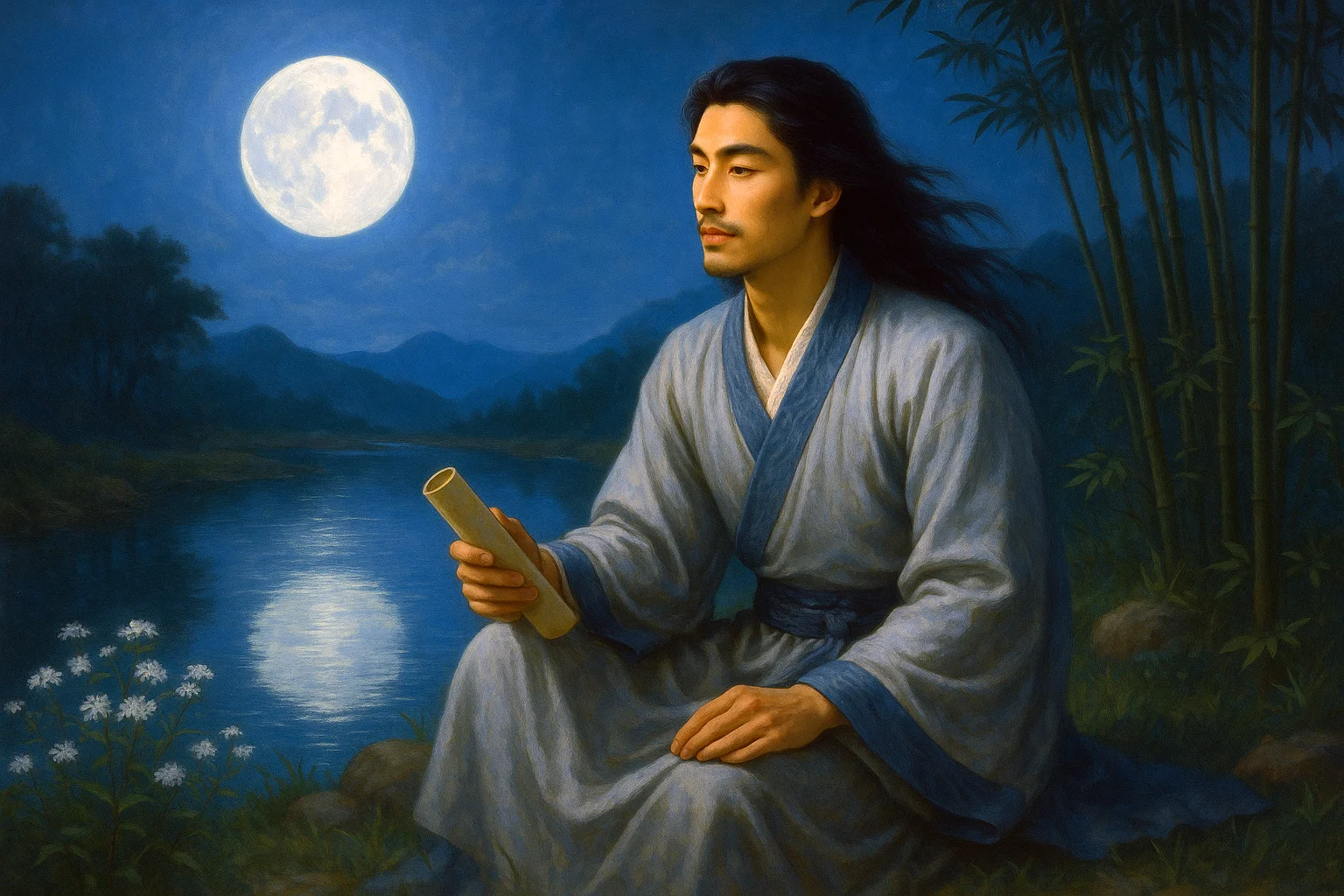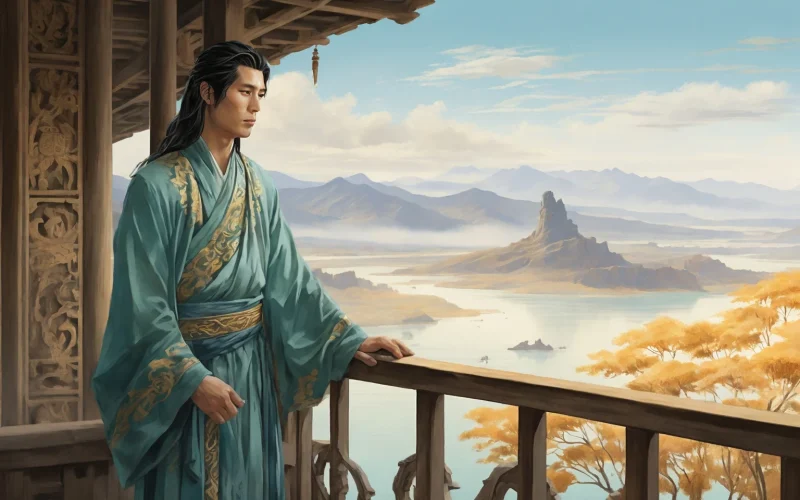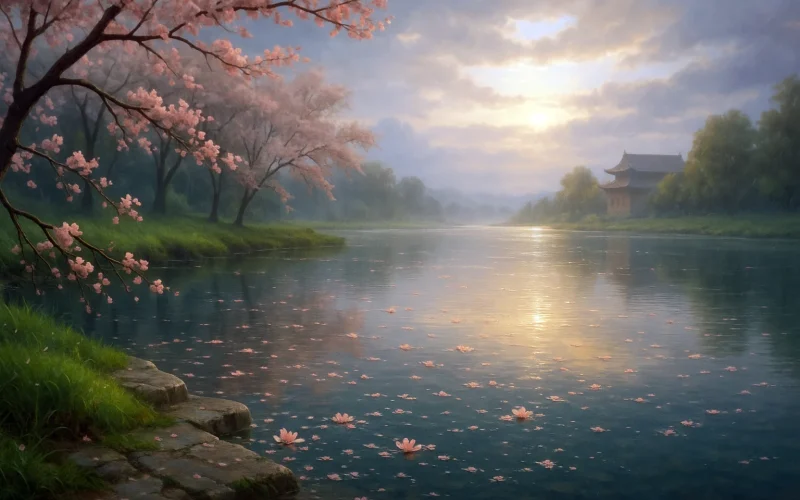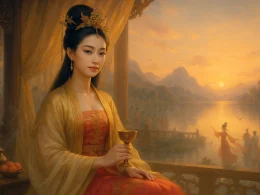To cage all wonders in this tower's hold,
I lean on picture-frame balustrade, world unrolled.
Clouds riffle water's amethyst-turquoise sheen,
Sky drinks mountain's cyan-vermilion dream.
Moon of Huainan melts sutra-chants deep,
Sails from beyond catch winds of the endless steep.
My old robe clings to dust of earthly plight,
While mind's eye chases dark geese in flight.
Original Poem
「甘露寺多景楼」
曾巩
欲收嘉景此楼中,徙倚阑干四望通。
云乱水光浮紫翠,天含山气入青红。
一川钟呗淮南月,万里帆樯海外风。
老去衣衿尘土在,只将心目羡冥鸿。
Interpretation
Composed during Zeng Gong's middle-aged journey through Jiangnan, this work emerges from his ascent of the famed Multi-View Tower in Zhenjiang, Jiangsu. Perched on Beigu Mountain's Ganlu Temple, this vantage point had inspired generations of literati. Though weathered by bureaucratic travels and approaching his twilight years, Zeng reveals undimmed ambition through vast riverine vistas—where landscape becomes a canvas for ideals and life reflections.
First Couplet: "欲收嘉景此楼中,徙倚阑干四望通。"
Yù shōu jiā jǐng cǐ lóu zhōng, xǐ yǐ lángān sì wàng tōng.
To gather earth's finest views in this tower's hold, / I lean on rails where all quarters unfold.
The opening verbs "gather" (收) and "unfold" (通) perform spatial alchemy—compressing panoramas into poetic possession while expanding the observer's dominion. The rail-leaning posture embodies the scholar-official's dual stance: physically anchored yet visually unbounded.
Second Couplet: "云乱水光浮紫翠,天含山气入青红。"
Yún luàn shuǐ guāng fú zǐ cuì, tiān hán shān qì rù qīng hóng.
Clouds fracture waterlight to float mauve-and-jade; / sky drinks mountain-breath in blue-vermilion grade.
Zeng's chromatics rival Song porcelain glazes: "mauve-and-jade" (紫翠) suggests temple rooftops shimmering through mist, while "blue-vermilion" (青红) captures the mineral fusion of dawn-lit peaks. The verbs "fracture" (乱) and "drink" (含) animate cosmological processes—weather as calligraphy, atmosphere as inkwash.
Third Couplet: "一川钟呗淮南月,万里帆樯海外风。"
Yī chuān zhōng bài Huáinán yuè, wàn lǐ fān qiáng hǎiwài fēng.
Moon silvers Huai's plains with temple bells' rhyme; / sea winds pump sails from beyond space and time.
Sensory expansion achieves sublime tension: the vertical "moon-bells" axis counters the horizontal "wind-sails" vector. "Beyond space and time" (海外风) transforms maritime trade winds into metaphysical currents, echoing the poet's own far-reaching aspirations.
Fourth Couplet: "老去衣衿尘土在,只将心目羡冥鸿。"
Lǎo qù yī jīn chéntǔ zài, zhǐ jiāng xīn mù xiàn míng hóng.
Age stains my robe with official travel's grime; / my mind's eye trails wild geese past their prime.
The closing confession pivots on textile symbolism—the dust-laden robe (衣衿) of bureaucratic service contrasts with the "wild geese's" (冥鸿) unburdened wings. "Mind's eye" (心目) performs crucial work: though physically earthbound, the poet's gaze achieves migratory transcendence. These celestial migrants become soul emblems—unlike the earth-tethered speaker, they obey only cosmic rhythms.
Holistic Appreciation
This poem begins with a scenic depiction of ascending a tower, gradually transitioning into profound reflections on human existence—moving from external observation to internal contemplation, from landscape to emotion, in a tightly structured progression. The first six lines paint a layered vista, progressing from near to far, stillness to motion, not only showcasing the majestic yet serene beauty of Multi-View Tower but also using scenery to build emotional momentum. The final couplet delivers a sudden turn, synthesizing personal experience with lofty ideals, embodying the scholar's introspection and aspirations.
With a perspective steeped in Jiangnan's natural aesthetics, the poet constructs a sensory space where vision, sound, and emotion intertwine. The poem juxtaposes the vastness of river and sky against the transience of human affairs, blending the exuberance of grand landscapes with the melancholy of unfulfilled ambitions. This fusion creates a poetic style that is both majestic and subtly poignant.
Artistic Merits
- Expansive Imagery, Clear Perspective
The poet unfolds the view step by step from the tower—colors and sounds, movement and stillness, mountains and rivers, towers and moon, breeze and temple bells—all meticulously layered to form a panorama both grand and intricate. - Emotion Woven into Scenery, Ambition Embedded in Nature
Rather than stating ideals outright, the poet lets feelings arise organically from the landscape. The line "I envy the far-flying wild goose" resonates throughout, imparting depth to the poem's aspirations. - Precise Diction, Resonant Rhythm
Verbs like "float," "enter," "hold," and "envy" are vivid and exact, enhancing both imagery and cadence. The strict tonal parallelism reflects Zeng Gong's refined and disciplined literary style.
Insights
This work reveals how, amid sublime natural beauty, the poet maintains an indomitable spirit yearning for noble ideals. It teaches that in life's turbulence, one should preserve transcendent sentiment and undimmed pursuit—even in old age, the mind can still cherish grand ambitions and gaze skyward.
The "wild goose" symbolizes not just the poet's self-reflection but also a universal metaphor: setbacks must not eclipse lifelong aspirations. Only by keeping lofty goals alive can one break through adversity.
About the Poet

Zeng Gong (曾巩, 1019 - 1083), a native of Nanfeng in Jiangxi province, stands among the illustrious "Eight Great Masters of Tang-Song Prose." His writings distinguished themselves through an elegant classical balance, celebrated for their rigorous argumentation and refined literary craftsmanship. While his poetry embraced an artless subtlety, his prose achieved what critics hailed as "the very essence of purity" - an achievement that, though perhaps less dazzling than his contemporaries like Su Shi or Wang Anshi, earned him posthumous reverence as the founding master of the "Nanfeng Literary School."












